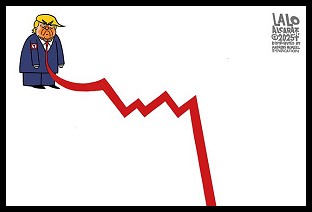
Early word on what happened today during the U.S. Supreme Court's hearing on the crucial Section 5 of the Voting Rights Act in Shelby County, AL v. Eric Holder is not encouraging. This could come to be seen as a very dark day for voting rights in this country, as a landmark provision of the 1965 Voting Rights Act may be on the verge of being dismantled and, arguably, a half a decade of civil rights advancements along with it.
Late last night we detailed what's at stake and how the activist Supremes are likely to intercede in what is clearly a Congressional duty, as specifically ascribed to them in the 15th Amendment of the U.S. Constitution. That, despite a stunning 98 to 0 vote in the U.S. Senate to re-authorize the VRA for another 25 years as is, after 21 hearings and some 15,000 pages of documentation on the continuing blight of racial discrimination, as recently as 2006.
While it's always a perilous exercise to try and read the tea leaves from a SCOTUS hearing, The Nation's Ari Berman, who was present in the court room this morning, Tweets, disturbingly today: "In oral argument, Scalia likened Congressional support for Voting Rights Act to a 'perpetuation of racial entitlement'". He went on to indicate his "quick reaction" to the hearing was that, that while the five Republican Justices are "skeptical of Sec 5," there is a "small chance Kennedy can still be persuaded." He notes, that, incredibly, "Voter suppression attempts in [the] last election didn't even come up during SCOTUS arguments about Voting Rights Act".
Because the Supreme Court still operates in the 1800s, there was no live audio or video of today's hearing. The transcript, however, should be made available later today [Update: transcript is now linked at the bottom of this article] and audio will be made available on Friday.
For now, NBC reports today's hearings this way:
NBC’s Pete Williams reported after the oral argument, "I think it’s a safe prediction to say that the Voting Rights Act, as it now stands, is not going to survive. The question is: how far will the Supreme Court go in striking parts of it down?"
Williams said what seemed to concern a majority of the justices was "the fact that the law is too backward looking."
...
Williams reported that during the one hour-and-15 minute oral argument, Justice Anthony Kennedy said that the post-World War II Marshall Plan to rebuild Europe "was a good thing at one time, but times change."
New York Times' Adam Liptak described today's hearing in more, if similarly disturbing detail this way...


 Trump EPA Guts Enviro Justice Office: 'BradCast' 4/24/25
Trump EPA Guts Enviro Justice Office: 'BradCast' 4/24/25 'Green News Report' 4/24/25
'Green News Report' 4/24/25
 Nation's Largest Broadcaster Mandates News Outlets Hoax Viewers to Help Gut FCC Rules: 'BradCast' 4/23/25
Nation's Largest Broadcaster Mandates News Outlets Hoax Viewers to Help Gut FCC Rules: 'BradCast' 4/23/25 Trump's FCC on Precipice of Ending All Limits on Corporate Control of Local TV Stations
Trump's FCC on Precipice of Ending All Limits on Corporate Control of Local TV Stations GOP Earth Day 2025 Hypocrisies and Dilemmas: 'BradCast' 4/22/25
GOP Earth Day 2025 Hypocrisies and Dilemmas: 'BradCast' 4/22/25 'Green News Report' 4/22/25
'Green News Report' 4/22/25 Pope Francis Dies,
Pope Francis Dies, Sunday
Sunday  Sunday 'Zero Day' Toons
Sunday 'Zero Day' Toons Soc. Sec. Expert Warns DOGE Hastening Collapse, Privati-zation: 'BradCast' 4/10/2025
Soc. Sec. Expert Warns DOGE Hastening Collapse, Privati-zation: 'BradCast' 4/10/2025 'Green News Report' 4/10/25
'Green News Report' 4/10/25 Trump Blinks, Chaos Reigns, Markets Spike as Many Tariffs Remain Despite 90-Day 'Pause': 'BradCast' 4/9/25
Trump Blinks, Chaos Reigns, Markets Spike as Many Tariffs Remain Despite 90-Day 'Pause': 'BradCast' 4/9/25 SCOTUS Deportation Ruling Grimmer Than First Appears: 'BradCast' 4/8/25
SCOTUS Deportation Ruling Grimmer Than First Appears: 'BradCast' 4/8/25 'Green News Report' 4/8/25
'Green News Report' 4/8/25 Cliff Diving with Donald: 'BradCast' 4/7/25
Cliff Diving with Donald: 'BradCast' 4/7/25 Sunday 'Don't Look Down' Toons
Sunday 'Don't Look Down' Toons 'Green News Report' 4/3/25
'Green News Report' 4/3/25 'Mob Boss' Trump's Trade Sanctions Tank U.S., World Markets: 'BradCast' 4/3/25
'Mob Boss' Trump's Trade Sanctions Tank U.S., World Markets: 'BradCast' 4/3/25 Crawford Landslide in WI; Booker Makes History in U.S. Senate: 'BradCast' 4/2/25
Crawford Landslide in WI; Booker Makes History in U.S. Senate: 'BradCast' 4/2/25 Judge Ends Challenge to GA's Unverifiable, Insecure Vote System: 'BradCast' 4/1/25
Judge Ends Challenge to GA's Unverifiable, Insecure Vote System: 'BradCast' 4/1/25 Bad Court, Election News for Trump is Good News for U.S.: 'BradCast' 3/31
Bad Court, Election News for Trump is Good News for U.S.: 'BradCast' 3/31 Vets Push Back at Plan to Slash Health Care, 80K V.A. Jobs: 'BradCast' 3/27/25
Vets Push Back at Plan to Slash Health Care, 80K V.A. Jobs: 'BradCast' 3/27/25 Signal Scandal Worsens for Trump, GOP; Big Dem Election Wins in PA: 'BradCast' 3/26
Signal Scandal Worsens for Trump, GOP; Big Dem Election Wins in PA: 'BradCast' 3/26 'Emptywheel': Trump NatSec Team Should 'Resign in Disgrace': 'BradCast' 3/25/25
'Emptywheel': Trump NatSec Team Should 'Resign in Disgrace': 'BradCast' 3/25/25 USPS 'Belongs to the People, Not the Billionaires': 'BradCast' 3/24/25
USPS 'Belongs to the People, Not the Billionaires': 'BradCast' 3/24/25
 VA GOP VOTER REG FRAUDSTER OFF HOOK
VA GOP VOTER REG FRAUDSTER OFF HOOK Criminal GOP Voter Registration Fraud Probe Expanding in VA
Criminal GOP Voter Registration Fraud Probe Expanding in VA DOJ PROBE SOUGHT AFTER VA ARREST
DOJ PROBE SOUGHT AFTER VA ARREST Arrest in VA: GOP Voter Reg Scandal Widens
Arrest in VA: GOP Voter Reg Scandal Widens ALL TOGETHER: ROVE, SPROUL, KOCHS, RNC
ALL TOGETHER: ROVE, SPROUL, KOCHS, RNC LATimes: RNC's 'Fired' Sproul Working for Repubs in 'as Many as 30 States'
LATimes: RNC's 'Fired' Sproul Working for Repubs in 'as Many as 30 States' 'Fired' Sproul Group 'Cloned', Still Working for Republicans in At Least 10 States
'Fired' Sproul Group 'Cloned', Still Working for Republicans in At Least 10 States FINALLY: FOX ON GOP REG FRAUD SCANDAL
FINALLY: FOX ON GOP REG FRAUD SCANDAL COLORADO FOLLOWS FLORIDA WITH GOP CRIMINAL INVESTIGATION
COLORADO FOLLOWS FLORIDA WITH GOP CRIMINAL INVESTIGATION CRIMINAL PROBE LAUNCHED INTO GOP VOTER REGISTRATION FRAUD SCANDAL IN FL
CRIMINAL PROBE LAUNCHED INTO GOP VOTER REGISTRATION FRAUD SCANDAL IN FL Brad Breaks PA Photo ID & GOP Registration Fraud Scandal News on Hartmann TV
Brad Breaks PA Photo ID & GOP Registration Fraud Scandal News on Hartmann TV  CAUGHT ON TAPE: COORDINATED NATIONWIDE GOP VOTER REG SCAM
CAUGHT ON TAPE: COORDINATED NATIONWIDE GOP VOTER REG SCAM CRIMINAL ELECTION FRAUD COMPLAINT FILED AGAINST GOP 'FRAUD' FIRM
CRIMINAL ELECTION FRAUD COMPLAINT FILED AGAINST GOP 'FRAUD' FIRM RICK SCOTT GETS ROLLED IN GOP REGISTRATION FRAUD SCANDAL
RICK SCOTT GETS ROLLED IN GOP REGISTRATION FRAUD SCANDAL VIDEO: Brad Breaks GOP Reg Fraud Scandal on Hartmann TV
VIDEO: Brad Breaks GOP Reg Fraud Scandal on Hartmann TV RNC FIRES NATIONAL VOTER REGISTRATION FIRM FOR FRAUD
RNC FIRES NATIONAL VOTER REGISTRATION FIRM FOR FRAUD EXCLUSIVE: Intvw w/ FL Official Who First Discovered GOP Reg Fraud
EXCLUSIVE: Intvw w/ FL Official Who First Discovered GOP Reg Fraud GOP REGISTRATION FRAUD FOUND IN FL
GOP REGISTRATION FRAUD FOUND IN FL



















 The first section of the
The first section of the 







 I'd strongly recommend that you read this piece by Jeff Spross, entitled
I'd strongly recommend that you read this piece by Jeff Spross, entitled  Last Friday night on MSNBC, Rachel Maddow proudly, and justifiably,
Last Friday night on MSNBC, Rachel Maddow proudly, and justifiably, 
 We'll have a related-ish story on all of this Monday. But, for the moment --- in the comment thread of
We'll have a related-ish story on all of this Monday. But, for the moment --- in the comment thread of  With another papal election coming up, one might wonder how the
With another papal election coming up, one might wonder how the 
 In a response to a charge
In a response to a charge 
 On Monday night, NBC News aired its new documentary, Hubris: Selling the Iraq War, based on the
On Monday night, NBC News aired its new documentary, Hubris: Selling the Iraq War, based on the 
 As our government was making a fraudulent case to attack Iraq in 2002-2003, the MSNBC television network was doing everything it could to help, including booting Phil Donahue and Jeff Cohen off the air.
As our government was making a fraudulent case to attack Iraq in 2002-2003, the MSNBC television network was doing everything it could to help, including booting Phil Donahue and Jeff Cohen off the air.













